Book contents
- Frontmatter
- Contents
- Figures
- Tables
- Contributors
- 1 Introduction: corporate governance after the ‘end of history’
- Part I Historical trajectories of business and regulation
- 2 Corporate governance and financial crisis in the long run
- 3 Financialism
- 4 Legitimating power
- 5 Engaging corporate boards
- 6 The primacy of Delaware and the embeddedness of the firm
- 7 The new embeddedness of the corporation
- Part II New interests, new shareholder constellations, new landscapes
- Part III Labor’s evolution in the new economy
- Part IV The transnational embedded firm and the financial crisis
- Part V Conclusion
- Index
- References
2 - Corporate governance and financial crisis in the long run
from Part I - Historical trajectories of business and regulation
Published online by Cambridge University Press: 07 September 2011
- Frontmatter
- Contents
- Figures
- Tables
- Contributors
- 1 Introduction: corporate governance after the ‘end of history’
- Part I Historical trajectories of business and regulation
- 2 Corporate governance and financial crisis in the long run
- 3 Financialism
- 4 Legitimating power
- 5 Engaging corporate boards
- 6 The primacy of Delaware and the embeddedness of the firm
- 7 The new embeddedness of the corporation
- Part II New interests, new shareholder constellations, new landscapes
- Part III Labor’s evolution in the new economy
- Part IV The transnational embedded firm and the financial crisis
- Part V Conclusion
- Index
- References
Summary
Introduction
The corporation is the basic organizational unit, and among the most fundamental legal institutions, of a market economy. It should be capable of contributing both to economic growth and, arguably, to human development in a broader sense. There are, however, influential voices which doubt its capacity to do this. Joel Bakan’s description of the corporation as a “pathological institution, a dangerous possessor of the great power it yields over people and societies,” might have seemed exaggerated to some. Yet Bakan’s point was precisely grounded in what he described as the company’s “legally defined mandate … to pursue, relentlessly and without exception, its own self interest, regardless of the often harmful consequences it might cause to others.” Behavioral economics defines a sociopath as one who “treats others instrumentally, caring only about what he derives from the interaction, whatever the cost to the other party.” Such behavior, while regarded as universal and in some sense “natural” by the axioms of neoclassical economics, is probably confined to a minority of human beings; around a quarter of participants in ultimatum game experiments display entirely self-regarding behavior in this sense. Somehow, at the beginning of the twenty-first century, the corporation had evolved to the point of being a sociopathic institution, at odds with deep-rooted pro-social tendencies in human psychology and behavior.
The point was not lost on certain commentators occupying a pivotal position in the contemporary practice of corporate governance. According to Leo Strine, Vice Chancellor of the Delaware Court of Chancery, the subject-matter of corporate governance – the matters which interest the “haves of the corporate governance world” who include institutional investors, non-executive directors, CEOs and activist shareholders – were not addressing the questions “most relevant to ordinary people.” These included: “will the economy continue to produce well-paying, decent jobs in the face of international competition? … Can the [American] nation afford to honor the promises made to retirees as the percentage of the population that is elderly markedly increases? How can citizens of Western nations maintain their current lifestyles while reducing their disproportionate consumption of the Earth’s natural resources?” Yet, according to Strine, it was “simply silly to believe that questions like these will be fairly and justly considered in the corporate polity itself, in which the only constituency with a vote is capital and in which the only other constituency with real power are the directors and top managers.”
- Type
- Chapter
- Information
- The Embedded FirmCorporate Governance, Labor, and Finance Capitalism, pp. 15 - 41Publisher: Cambridge University PressPrint publication year: 2011
References
- 7
- Cited by



